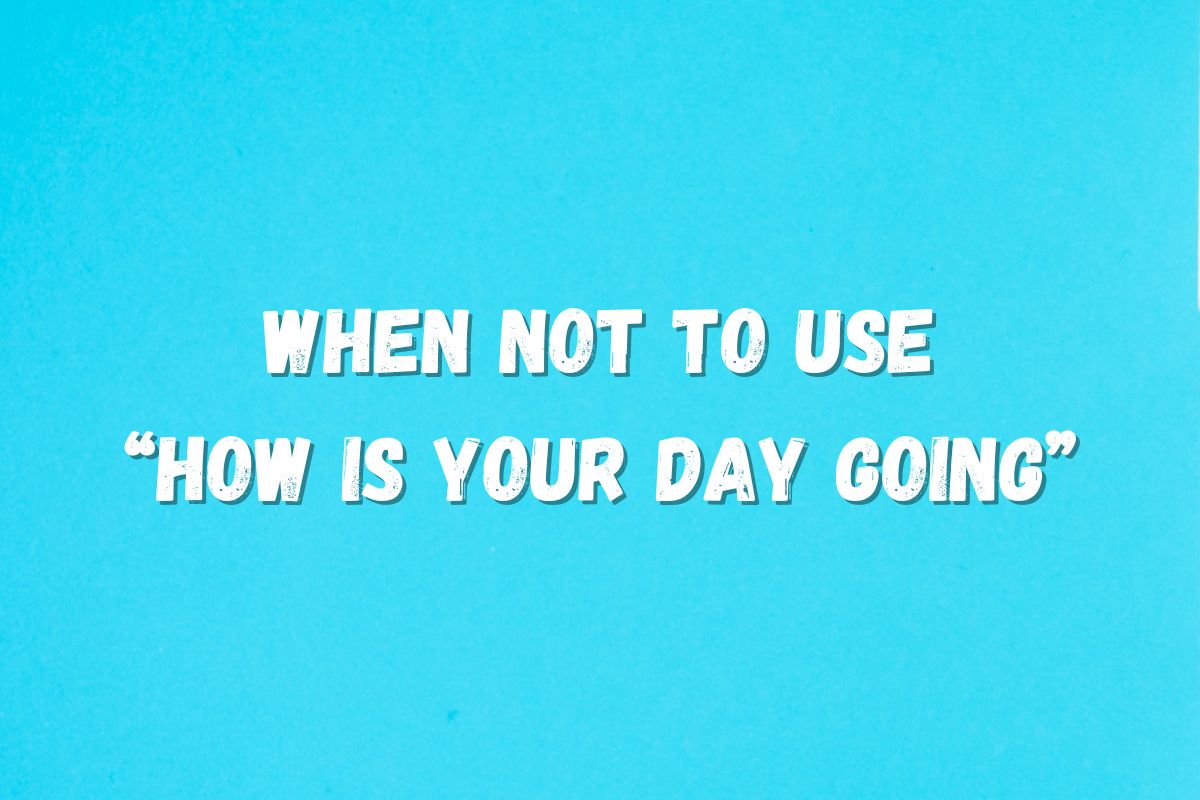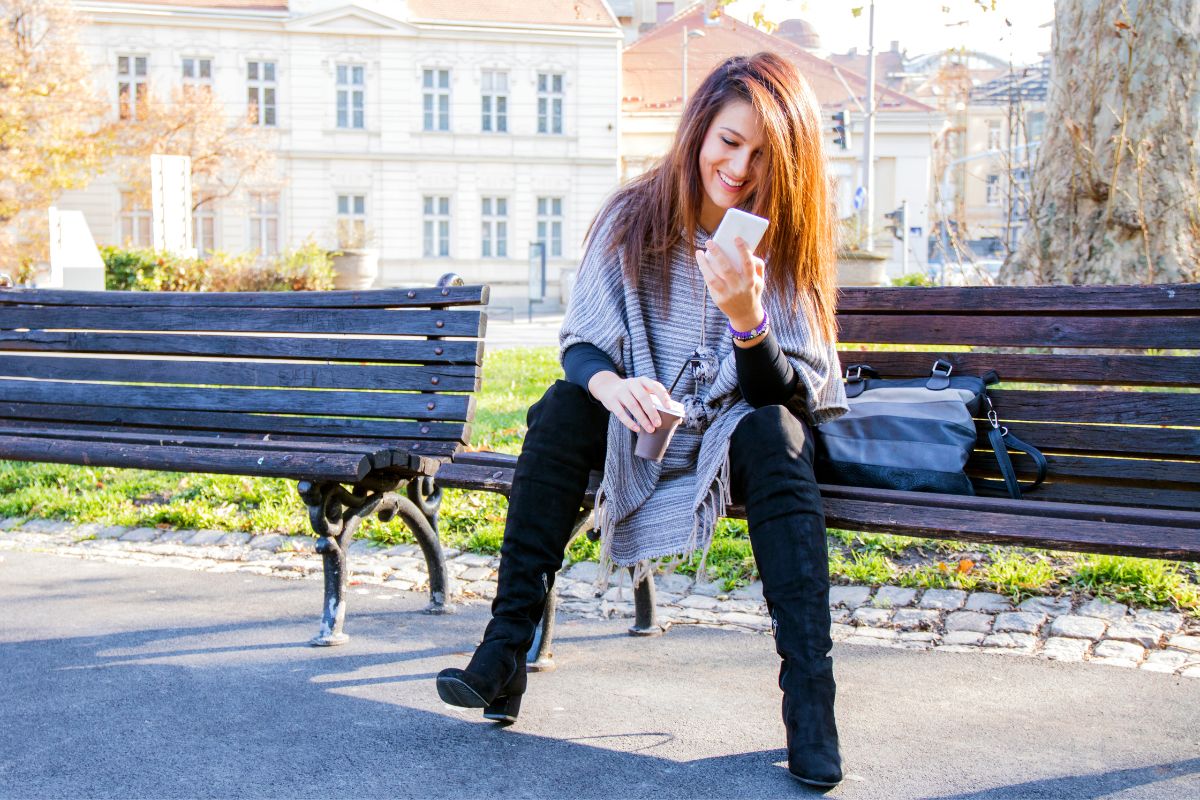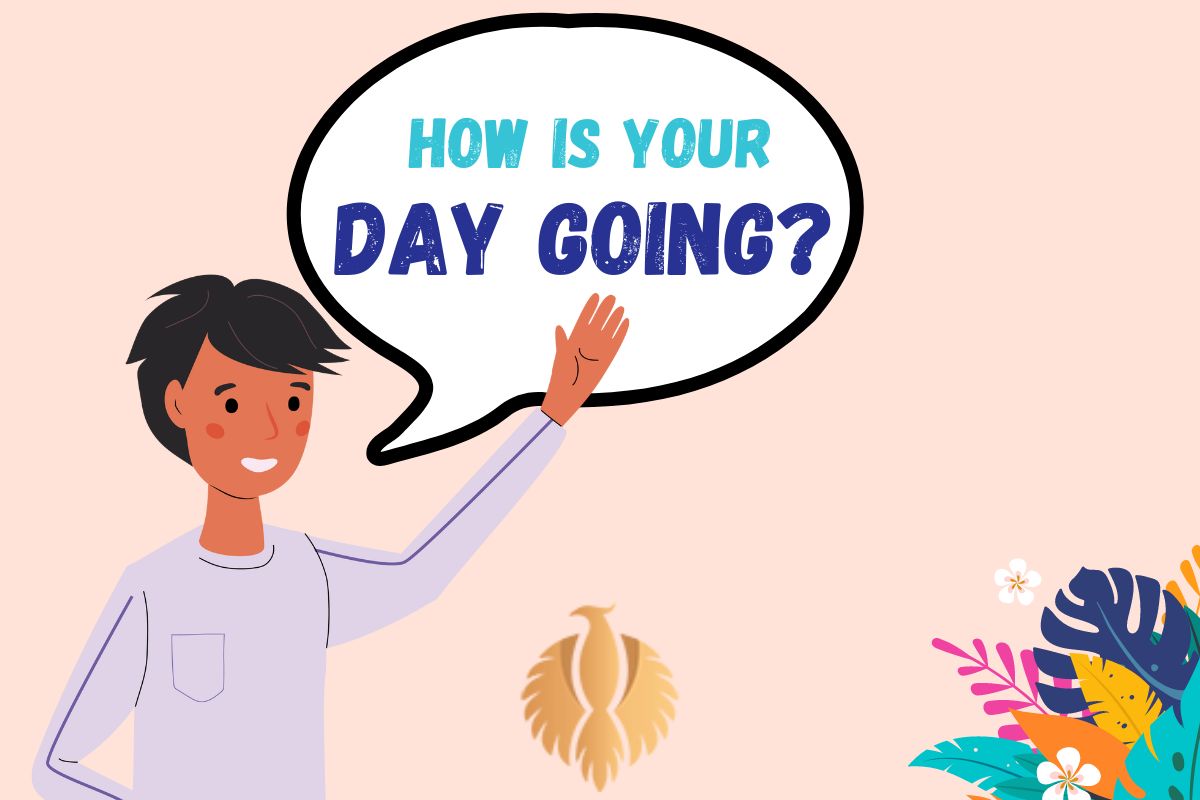The phrase “How is your day going?” is a common inquiry in English-speaking countries, used to ask about someone’s well-being and the progress of their day. This expression serves as a casual conversation starter, allowing individuals to share highlights, challenges, or general updates from their day. It reflects the broader social practice of showing interest in others’ lives and checking in on their current state.

While the exact origin of “How is your day going?” is not specifically documented, it aligns with the general tradition of expressing concern for others’ well-being through simple, courteous greetings. This phrase is a polite and friendly way to initiate conversation and connect on a personal level.
In this article, we will explore the best responses to “How is your day going?” to help you navigate these everyday interactions with ease and authenticity.
Understanding the nuances of this common greeting can enhance your communication skills and strengthen your connections with others. Let’s delve into the various ways you can respond to this question, ensuring your replies are thoughtful and engaging.
You might also enjoy:Too Cute Meaning Vs To Cute (To Vs Too) + Examples
Is it correct to say “How is your day going?”

The phrase “How is your day going?” is grammatically correct and commonly used in everyday conversations. It serves as a casual and friendly way to inquire about someone’s well-being and the progression of their day.
However, it is important to recognize that language usage can vary based on cultural and regional norms, so it is essential to consider the context and the relationship with the person you are addressing.
Asking “How is your day going?” is not only grammatically correct but also a widely accepted and utilized phrase in casual conversations. It provides an informal method to check on someone’s well-being and to understand how their day is unfolding.
However, it is crucial to be mindful that language usage can differ depending on cultural and regional norms, making it important to consider the context and your relationship with the individual you are speaking to.
When I ask, “How is your day going?” my intention is to genuinely hear about the individual’s experiences and feelings.
This phrase helps foster a deeper connection and demonstrates that I care about their well-being. It is versatile and can be used in various situations, whether conversing with a coworker, catching up with a friend, or engaging in small talk with a new acquaintance.
One reason I prefer using “How is your day going?” is that it often prompts a more detailed response compared to the typical “How are you?” While “How are you?” might elicit a brief and sometimes superficial reply like “I’m fine,” inquiring about someone’s day encourages them to share more about their activities, emotions, and noteworthy events. This approach fosters richer conversations and helps build stronger connections.
When using this phrase, I always consider the context. For example, in a workplace setting, I might say it during a break or at the start of a meeting to create a friendly atmosphere.
In more formal contexts, I might opt for a different expression, such as “How has your day been so far?” to maintain professionalism while still showing concern for the other person’s well-being.
Cultural and regional differences can also influence how this phrase is received. In some cultures, individuals might be more reserved and less inclined to share personal details, while in others, they might be very open and expressive.
I try to be aware of these nuances and adjust my approach accordingly. For instance, when speaking with someone from a culture where personal questions are less common, I might start with a more general topic before gradually moving to more personal matters.
Timing is another important aspect to consider. Asking “How is your day going?” in the morning might prompt someone to share their plans and hopes for the day, while asking it later in the afternoon or evening could lead to a discussion about their experiences up to that point. Being mindful of these details can enhance the depth and relevance of our conversations.
By paying attention to context, cultural nuances, and timing, you can use the phrase “How is your day going?” to foster meaningful interactions and build stronger connections with others.
Some points about using “How is your day going?”;
- “How is your day going?” is a common greeting used to inquire about someone’s well-being.
- It is a friendly and casual way to start a conversation and show that you care about the other person’s feelings.
- This question can help you connect with others on a more personal level.
- It can make the other person feel important and valued.
- It shows that you are interested in the other person’s experiences and are willing to listen.
- It can be a nice gesture to check in on someone’s mood and see if they need any support.
- This question can be a good way to show empathy towards someone who may be going through a tough time.
- It can open the door for a deeper conversation about how the person is really feeling.
- Asking “How is your day going?” can help build trust and rapport with the other person.
- It can be a simple way to show kindness and compassion towards others.
- This question can lead to a more meaningful and authentic interaction.
- It is a great way to show that you are attentive and care about the other person’s well-being.
- It can help you understand the other person’s perspective and gain insights into their feelings.
- This question can be a good way to start a positive and uplifting conversation.
- It is a thoughtful gesture that can make someone feel seen and heard.
- Asking “How is your day going?” can help you create a more supportive and nurturing environment.
- It can be a way to show that you value the other person’s opinions and experiences.
- This question can help foster stronger relationships and connections with others.
- It is a simple but effective way to show that you are interested in the other person’s life.
- Asking “How is your day going?” can help you practice active listening and empathy.
- It is a great conversation starter that can lead to more meaningful interactions.
- This question can help you show your support and care for the other person.
- It is a positive and encouraging way to engage with others.
- It is a way to show that you are present and focused on the other person’s needs.
- This question can help you create a warm and welcoming atmosphere in your conversations.
- It is a way to demonstrate your willingness to connect with others on an emotional level.
- Asking “How is your day going?” can help you establish a sense of camaraderie and understanding with the other person.
- It is a simple but powerful way to show that you value the other person’s well-being and happiness.
When can we use “How is your day going?”

You can use “How is your day going?” in various situations, particularly when:
- Engaging in casual conversations
It’s a common and friendly way to start a conversation and show genuine interest in someone’s well-being.
- Catching up with friends or family
It’s a natural question to ask when you want to know how their day has been and catch up on their recent activities.
- Building rapport with colleagues or acquaintances
It can help foster a friendly and positive atmosphere, especially when you’re getting to know someone or maintaining workplace relationships.
- Demonstrating care and empathy
Asking about someone’s day shows that you value their experiences and emotions, and it provides an opportunity for them to share any highlights or challenges they may have encountered.
- Expressing concern or support
If you know someone has been dealing with a particular situation, asking about their day can open the door for them to share their thoughts or feelings, allowing you to offer support or assistance if needed.
Remember, it’s essential to consider the context and the relationship with the person you’re speaking to. “How is your day going?” can be a friendly and well-intentioned question, but it’s important to be sensitive and respectful in certain situations.
You might also enjoy:What Kind of Vs What Kinds of – Differences + Examples [2025]
When Not to Use “How Is Your Day Going”

While “How is your day going?” is a common and casual question, there are some situations where it may be inappropriate or insensitive to use. Here are a few examples:
- During a difficult or sensitive time
If someone is going through a challenging situation or experiencing a personal loss, asking about their day may come across as dismissive or trivialising their emotions.
- In a professional setting
In formal or professional contexts, it’s generally best to stick to more appropriate greetings and conversations related to work or business matters.
- When there are time constraints
If you’re in a rush or have limited time for a conversation, asking about someone’s day can open up a lengthy discussion that you may not have the time for.
- With someone you don’t know well
“How is your day going?” can be seen as a more personal question. If you’re not familiar with the person or in a more formal setting, it’s better to opt for a more general greeting or topic of conversation.
- When it’s clear their day is going poorly
If you can already tell that someone is having a rough day or if they’ve shared a negative experience, it might be more considerate to offer support or ask if there’s anything you can do to help, rather than asking about their day.
You might also enjoy:Interested In or On: The Differences + Examples [2025]
My suggestions for responding to “How is your day going?”
1. My day is going great, thank you for asking!
2. It’s been a wonderful day so far, thanks!
3. I’m having a fantastic day, how about you?
4. So far, my day has been pretty good. How about yours?
5. It’s been a productive and enjoyable day for me!
6. I’m having a really good day. How about yourself?
7. I can’t complain, my day is going quite well!
8. It’s been a lovely day filled with positive moments.
9. My day is going smoothly, thank you for asking!
10. I’m having a pleasant day. How about you?
11. It’s been a busy but fulfilling day so far!
12. Everything is going well. Thanks for asking!
13. My day has been going wonderfully. How about yours?
14. I’m having an awesome day. Hope you are too!
15. It’s been a great day filled with good vibes.
16. I’m having a fantastic day. Thanks for checking in!
17. My day is going splendidly. How about yours?
18. I’m having a really good day. I hope yours is too!
19. It’s been a delightful day so far. How’s yours going?
20. My day is going smoothly. I appreciate you asking!
21. I’m having a wonderful day. How about yourself?
22. It’s been a productive and positive day for me!
23. I’m having a good day, thank you for asking!
24. It’s been a pretty good day overall. How about yours?
25. My day is going quite well. Hope yours is too!
26. I’m having a great day. Thanks for wondering!
27. It’s been an enjoyable day so far. How’s yours going?
28. I’m having a fantastic day. I hope you are too!
29. It’s been a really good day. Thanks for asking!
30. My day is going splendidly. How about yours?
My alternatives to “How is your day going?”:
1. How has your day been so far?
2. How is your day unfolding?
3. How has your day treated you?
4. How are things going for you today?
5. How is your day progressing?
6. How is your day shaping up?
7. How is your day panning out?
8. How is your day coming along?
9. How is your day unfolding thus far?
10. How is your day going thus far?
11. How has your day been treating you?
12. How is your day going up until now?
13. How is your day looking so far?
14. How is your day turning out?
15. How is your day developing?
16. How is your day transpiring?
17. How is your day going on your end?
18. How is your day progressing along your journey?
19. How has your day unfolded up to this point?
20. How is your day shaping up for you?
21. How is your day progressing on your side?
22. How is your day going in your world?
23. How is your day treating you thus far?
24. How is your day advancing for you?
25. How is your day moving along?
26. How has your day been going for you?
27. How is your day playing out?
28. How is your day turning out for you?
29. How is your day moving forward?
30. How is your day going on your part?
In what situations can we use ‘How is your day going?’?
- At Work: Asking your colleagues “How is your day going?” can help create a positive and supportive work environment. It shows that you care about their well-being and can lead to more effective teamwork.
- In a Networking Event: Using this question can be a great icebreaker in networking events. It can help you start conversations with new people and establish connections on a more personal level.
- With Friends: Checking in with your friends by asking “How is your day going?” is a thoughtful way to show that you value their friendship. It can also lead to more meaningful conversations.
- With Family Members: Checking in with your family members using this question can help strengthen your relationships. It shows that you care about their daily experiences and emotions.
- In a Customer Service Setting: Asking customers “How is your day going?” can help create a positive customer experience. It shows that you value their feelings and are willing to provide support.

- With Strangers: Asking strangers “How is your day going?” can be a kind gesture that shows your empathy and willingness to connect with others. It can brighten someone’s day.
- In a Counseling Session: Using this question in a counseling session can help the client feel heard and supported. It can open the door for deeper discussions about their emotions and feelings.
- In a Support Group: Asking members of a support group “How is your day going?” can create a sense of community and understanding. It can help foster a supportive environment for everyone involved.
- During a Mentorship Meeting: Asking your mentee “How is your day going?” can show that you care about their well-being beyond just professional development. It can help strengthen the mentor-mentee relationship.
- During a Job Interview: Using this question can help break the tension in a job interview and make the conversation more relaxed. It can also give the interviewer insights into the candidate’s emotional state.
- In a Classroom Setting: Asking students “How is your day going?” can help you connect with them on a more personal level. It can also show that you care about their well-being beyond academic performance.
6. With Strangers: Asking strangers “How is your day going?” can be a kind gesture that shows your empathy and willingness to connect with others. It can brighten someone’s day.
You Might Also Enjoy:Reinforce Vs Reenforce: 10 Differences + Examples [2025]
“How is your day going?” In Literature

In literature, the phrase “how is your day going” is not commonly used as it is more colloquial and informal.
However, if we were to incorporate a similar sentiment into a literary context, we could rephrase it in a more poetic or expressive manner. For example:
- “Pray, tell me, how does the sun’s golden embrace colour your day?”
- “In this chapter of life, how do the pages of your day unfold?”
- “May the tapestry of your day be woven with threads of joy and serenity.”
- “As the hours dance upon the stage of existence, how does your day’s melody play?”
- “Within the realm of time’s passage, how does your day’s story unfurl?”
- “Amidst the symphony of life, how does your day’s rhythm resonate?”
- “Like a brushstroke upon the canvas of existence, how does your day paint its hues?”
- “Within the tapestry of existence, how does your day’s thread weave its tale?”
- “In the tapestry of moments, how does your day’s thread intertwine with destiny?”
- “As the stars twinkle in the night’s embrace, how does your day’s constellation align?”
These phrases aim to capture the essence of inquiring about someone’s day in a more poetic and literary manner.
“How is your day going?” In Social Contexts
In social contexts, asking “how is your day going” is a common and casual way to inquire about someone’s well-being and current experiences.
It is often used as a friendly conversation starter. Here are some examples of how it can be used in social contexts:
- “Hey, how is your day going? Anything exciting happening?”
- “I haven’t seen you in a while. How is your day going?”
- “We should catch up sometime. How is your day going so far?”
- “I hope you’re having a great day! How is it going for you?”
- “I wanted to check in and see how your day is going. Everything alright?”
- “How is your day going? Need any help with anything?”
- “Just wanted to say hello and ask how your day is going.”
- “How is your day going? Anything interesting or noteworthy happening?”
- “Hey, how is your day going? Want to grab a coffee and chat?”
- “I’m curious, how is your day going? Anything you’d like to share?”
These phrases are commonly used in social settings to engage in friendly conversation and show genuine interest in someone’s well-being and daily experiences.
You might also enjoy: Too Cute Meaning Vs To Cute (To Vs Too) + Examples
Fun substitutes to respond to “How is your day going?”

If someone asks, “How is your day going?” and you want to respond with a fun or lighthearted answer, here are some options:
1. “My day is going so well, I think I might just break into a spontaneous dance routine!”
2. “It’s been a rollercoaster of a day, but I’m enjoying the ride!”
3. “My day is going swimmingly, although I haven’t actually been swimming. Yet!”
4. “My day is like a comedy show, full of unexpected twists and hilarious moments.”
5. “My day is going fabulously! I’ve been spreading smiles like confetti.”
6. “It’s been a magical day so far, like I have a pocketful of pixie dust!”
7. “My day is going great, thanks for asking! I’m on a mission to find the world’s best cupcake.”
8. “My day is like a carnival ride – thrilling, a bit dizzying, but definitely fun!”
9. “My day is going splendidly! I’ve been embracing my inner superhero and saving the world one task at a time.”
10. “My day is filled with laughter and joy, like a never-ending comedy show!”
Remember, these responses are meant to be light-hearted and playful. Adjust them to match your own personality and sense of humour!
Formal substitutes to respond “How is your day going?”
If you’re looking for a more formal substitute to respond to the question “How is your day going?” in a professional or formal setting, you can use the following options:
1. “Thank you for asking. My day is progressing quite well, thank you.”
2. “I appreciate your inquiry. My day is going smoothly so far.”
3. “I’m pleased to say that my day is going quite positively. How about yours?”
4. “I’m doing well, thank you. My day has been productive and fulfilling thus far.”
5. “I’m grateful for your concern. My day is going according to plan and I’m making progress on my tasks.”
6. “I’m glad you asked. My day is proceeding satisfactorily, and I’m accomplishing my objectives.”
7. “I’m doing fine, thank you. My day has been busy, but I’m managing it effectively.”
8. “Thank you for inquiring. I’m having a good day, and I’m pleased with the progress I’ve made.”
9. “I appreciate your concern. My day is going smoothly, and I’m on track with my responsibilities.”
10. “I’m doing well, thank you. My day is unfolding as expected, and I’m focused on achieving my goals.”
These responses maintain a formal tone while expressing gratitude and providing a brief update on the progress of your day.
You might also enjoy:Which of the Following: Definition + Complete Usage + Grammar
Frequently Asked Questions
- Where does the phrase “How is your day going?” originate from?
The phrase is a common English greeting used to inquire about someone’s well-being and how their day has been progressing.
- When did the phrase “How is your day going?” become popular in everyday conversation?
The phrase has likely been used for a long time, but it gained more popularity in recent years as a casual and friendly way to start conversations.
- Are there similar greetings in other languages that convey a similar sentiment to “How is your day going?”
Yes, many languages have similar greetings that inquire about someone’s well-being or how their day has been going.
- Has the sentiment behind “How is your day going?” evolved over time?
While the sentiment remains focused on checking in on someone’s well-being, the phrase itself may have evolved in terms of how it is used in different contexts and settings.
Conclusion
In conclusion, asking polite questions like “How is your day going?” is an excellent way to demonstrate genuine care and concern for others. This simple inquiry can significantly enhance connections with friends, family, coworkers, and even new acquaintances. By posing this question, you move beyond casual conversation and show a true interest in their feelings and experiences. This, in turn, can lead to more meaningful discussions, offering insights into their emotions, challenges, and successes, and expressing empathy and investment in their well-being.
This question is effective in both casual and professional environments. In a work setting, asking a colleague or client “How is your day going?” helps create a welcoming and friendly atmosphere. It indicates that you see them as individuals, not just as part of a business interaction, and can be particularly beneficial for building rapport and nurturing positive working relationships.
In informal settings, such as when spending time with friends or family, this question can lead to deeper conversations, providing an opportunity to check in on their well-being and offer support. Even when meeting someone new, “How is your day going?” serves as an excellent icebreaker, making the other person feel at ease and appreciated. This sincere interest often paves the way for more lively and enjoyable exchanges.
It is essential to be mindful of the context and the relationship with the person you are speaking to. In certain cultures or situations, individuals may be more reserved and less inclined to share personal information. In such cases, starting with a broader topic and gradually moving to more personal subjects can be more appropriate. Sensitivity to these subtleties ensures that the question is used thoughtfully and respectfully.
Timing also plays a crucial role. Asking “How is your day going?” in the morning might encourage someone to share their plans and hopes for the day, while posing the question later in the afternoon or evening could lead to a discussion about their experiences so far.
Being attentive to these nuances can make your conversations more engaging and significant.
In essence, incorporating the question “How is your day going?” into your interactions can greatly enhance your relationships with others.
It fosters deeper connections, cultivates a warm atmosphere in both personal and professional settings, and encourages a more empathetic and connected community.
By making it a habit to include this question in your conversations, you reinforce relationships and contribute to making others feel acknowledged, appreciated, and important.
Whether engaging with friends, colleagues, or new acquaintances, this straightforward question can pave the way for meaningful and uplifting exchanges.

Hi, welcome to my blog! My name is Omid and I am thrilled to have you here! I am an English language teacher with 12 years of experience and hold multiple international certifications (TESOL, IELTS, TOEFL, PTE, CELTA). Additionally, I hold a PhD in Applied Linguistics with a specialization in Teaching English as a Second Language (TESL), which fuels my passion for teaching English and assisting others in mastering the language. To me, nothing is more rewarding than helping individuals enhance their English language abilities through various methods. So, let’s embark on this journey of learning English together.




